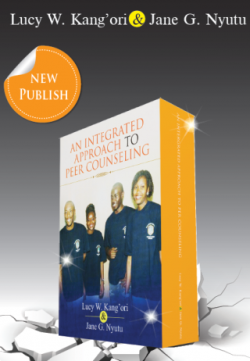
An Integrated Approach to Peer Counselling
At a time when indiscipline in schools is on the rise and students are faced with a myriad of psycho-social dilemmas that may interfere with successful studies, society is at a loss on how to tackle this crisis.

Part of the blame for the ongoing burning of dormitories and other buildings in secondary schools has been placed on the lack of counselors in secondary schools to cater to the psychological needs of students.
It is in the realisation of this need that Mount Kenya University has released a book relevant to the subject, titled An Integrated Approach to Peer Counselling. It seeks to address the underlying problems among the youth that, if not addressed, may contribute to indiscipline in schools and colleges.
The book is authored by two of the university’s leading counsellors, Jane Nyutu and Lucy Kang’ori.
The book explores the great need for trained and professional counselors who can facilitate growth and support to students as opposed to the current situation where teachers play the role despite not being trained counselors.
It is appropriate for teachers, counselors and those involved in the profession. It will also be useful to students who may seek to understand what counselling is. It explains the role of peer counselors in enhancing teacher-student as well as student-student relations. It promotes self awareness and gives insights on personal growth for better adjustment in school environment.
TEACHERS AS GUIDES
An Integrated Approach to Peer Counselling points out the need for people to understand the important role counsellors play within the school environment and how peer counselling adds value to the process of student success. Counselling being a relatively new discipline in Kenya, this book demystifies how contemporary issues that disturb the youth can be approached. It gives practical approaches towards problem solving.
The books observes that in the current setting, there is a big chasm in the relationship between teachers and students and, which has led to misunderstandings. It points out that people should understand the different roles of the teacher in the classroom and the teacher as a counselor. The two roles are not synonymous, it argues.
Teachers should be guides. They need to be trained in counselling if they want to know how to relate with students. Very few teachers have been trained in counselling, the book says.
According to the writers, there seems to be a disconnect and mistrust resulting from inability in dealing professionally with students issues leading to more indiscipline and students blaming teachers and vice versa, which could be addressed through effective counselling.
In 12 well balanced chapters, the writers use easy and understandable language to define counsellors, their role and how to go about implementing that role.
The book comes at a time when the Teachers Service Commission has revealed that it will begin hiring professional counsellors to work with students in schools.
It begins by explaining the rationale of training peer counsellors. It then details the basic ethical issues in counselling, understanding sexuality issues facing the youth and career guidance. It also deals with interpersonal and mental health issues as well as financial management.
The writers are counsellors of long standing. They provide case studies of real life situations that they have come across while counselling secondary school and college students.
They have avoided jargon in their writing and the book, while dealing with a complex issue, is still a joy to read.
Jane Nyutu is the director, Centre for Counselling and Capacity Building at Mount Kenya University and has been a secondary school teacher for many years.
SPIRIT OF UNDERSTANDING
She holds a Bachelor of Education degree from Kenyatta University, a Masters of Counselling Psychology from Daystar University. She is currently a PhD student at Kenyatta University.
Lucy Kang’ori, on the other hand, is a professional teacher, counsellor and a theologian. She trained as an S1 teacher in Kenyatta College in the early 1970s. She is currently working as a university counsellor at Mount Kenya University. She holds a higher diploma in guidance and counselling and a Masters degree in counselling theology from Nazarene University. She is also undertaking her PhD in counselling psychology at Kenyatta University.
According to the writers, there is a lot of mistrust between students and teachers, which has led to the increasing cases of indiscipline and arson in schools. With the creation of a spirit of mutual understanding, they say, there will be far fewer cases of indiscipline as are being experienced currently. The writers say that only a spirit of understanding will break the current impasse.
The book is available in leading bookshops and at all MKU centres in Kenya, Uganda and Tanzania.
Due to the large number of schools and the low numbers of trained counsellors , there is need to come up with other strategies which benefit student who need counselling.
The large numbers of students in schools, the limited number of trained counsellors, the heavy workload, socio-economic and technological changes all put pressure on teachers, students, parents and the society. Counseling is needed to address these challenges.


